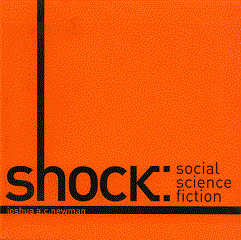The topic of this article
may not meet Wikipedia's notability guidelines for products and services .
Please help to demonstrate the notability of the topic by citing reliable secondary sources that are independent of the topic and provide significant coverage of it beyond a mere trivial mention. If notability cannot be shown, the article is likely to be merged, redirected, or deleted.
Find sources: "Shock: Social Science Fiction" – news · newspapers · books · scholar · JSTOR (April 2023) ( Learn how and when to remove this message )